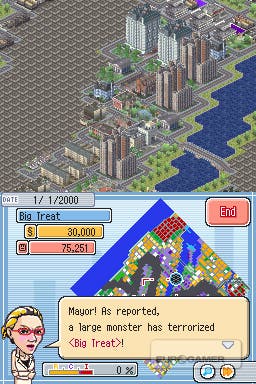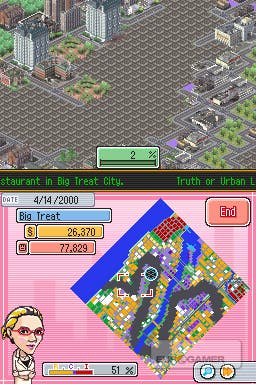SimCity
Streets of beige.
I've just been told I need to poke Santa Claus. As I ready my stylus and wait for jolly old Saint Nick to appear on screen so that the violent poking may begin, I find myself wondering "Is this really what SimCity is about?"
I mean, let's not try and paint the 1989 original as some humourless grump of a game. For all its strategic muscle, it was also a game that fully understood most people would approach its urban toybox in the same way that a child approaches their building blocks. Fun to build up, even more fun to knock down. Hence the presence of outlandish natural disasters and UFO attacks.
And yet...poking Father Christmas for cash prizes? Really? The flagrant Santa abuse is just one of several "action events" sprinkled through this handheld variation on Will Wright's original recipe, and I just can't shake the suspicion that someone looked at SimCity and decided that in order to appeal to the fabled Touch Generations it would require a hefty injection of over-the-top whimsy. Thus you find yourself setting off fireworks displays, blowing out fires and tapping away on giant apes to repel monster attacks. Are these moments of silliness really such a terrible deviation from the mood-lightening moments of old? Probably not, yet their implementation here still feels intrusive and gimmicky, an unwelcome distraction rather a refreshing change of pace.

At least these silly mini-games can be switched off, which is more than can be said for the slightly alarming proliferation of other quirks which conspire to make SimCity's DS debut a merely tolerable outing rather than an essential purchase.
Take, for example, the constant pestering from your citizens. Barely thirty seconds goes by without your on-screen advisor chirruping away, all exclamation marks and incessant beeping. Tap on them and you'll be told there's someone in your office, and would you like to talk to them? As the cast of Grange Hill so sagely suggested, just say NO. Trust me on this. It'll just be one of a small handful of irritating cartoon characters, and they'll take up your time with the same long-winded "comedy" conversations that leave you impatiently tapping the screen to skip to the part where they say they'd like a marina. Best to just ignore them. If you respond to every single one, you'll soon notice that even when you build their damn marina, they'll inevitably be back in a few minutes, with the exact same conversation, asking for...a marina. There is one upside to this constant interruption - you get to sign off each request with the stylus, meaning you can amuse yourself by sealing important civic documents with a crude doodle of a willy. Or maybe some hilarious boobies. Such larks.

The game is full of moments like this, moments that seem cute the first few times but repeat so often, and with so little variation, that the shallow nature of the conversion is revealed sooner rather than later. The actual city building is much as it always was, though obviously simplified for handheld play, but once your city is spreading and thriving it's all too easy to run out of things to do. Plumbing is now just a case of placing water towers rather than pipe networks. Electricity automatically crosses roads and incomplete zones, so it's entirely possible to fill a quarter of the sizeable game area without ever using power lines. Taxation and funding options are tucked away deep inside the information sheets, where you only need to venture if you've opted for one of the hardcore maps that start you off with just ten thousand simoleons. The emphasis is instead on balancing out the three types of zone - industrial, commercial and residential - and the use of status-changing civic buildings to keep Sim moods high, or crime and disasters low. In this slimmed down DS version it's more of a puzzle game than anything - build as many yellow zones as you can, but keep them away from red zones. Repeat until rich.


